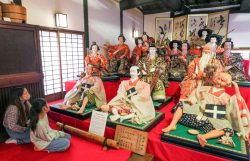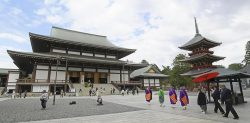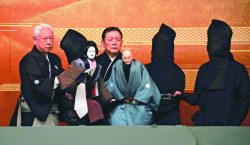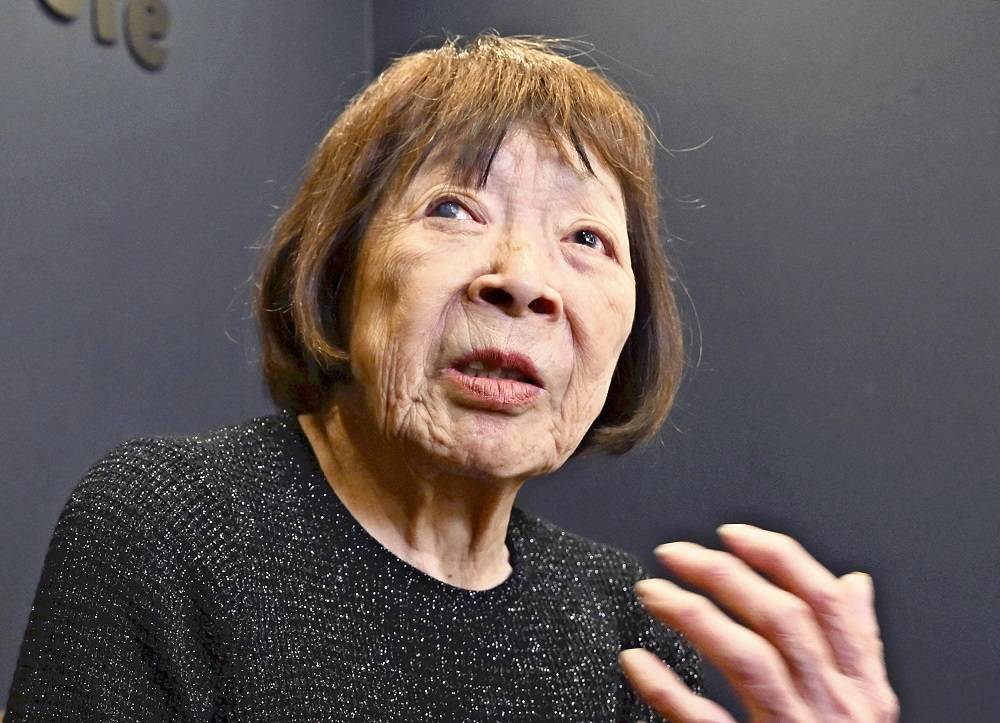
Toshiko Akiyoshi says, “Though I believe I contributed to jazz through composition, my nature is a pianist. Now, I want to thoroughly concentrate on playing piano.”
10:40 JST, April 24, 2023
As Toshiko Akiyoshi, 93, walked toward the stage, her footsteps were a little tentative. But once she sat at the piano, the change in the jazz star was remarkable.
Performing with her daughter, Monday Michiru, who sang and played flute, Akiyoshi improvised in a freewheeling style.
It was Nov. 14 last year at the Blue Note Tokyo jazz club, and at the end of the show, the full house crowd gave her a standing ovation.
Akiyoshi played with strong, fresh tones that belie her age.
“As long as my body can move smoothly and I’m asked to perform, I shall stand on the stage. A career as a jazz musician ends when one becomes unable to do a concert tour,” she said.
The United States-based Akiyoshi has firmly established herself as a pianist, composer and arranger in the genre.
Her path was not always smooth, as symbolized by the song that has come to represent her, “Long Yellow Road.”
“I composed that number when I was starting out in music in the United States. I reflected on my memory of the dusty roads in Manchuria [today’s northeast region of China], where I was born and raised, and my determination to make it on the long hard road of the U.S. jazz world as a person of the yellow race,” she said.
After World War II, Akiyoshi resettled in Beppu, Oita Prefecture, where she first encountered jazz. Then she moved to Tokyo, where her profile as a jazz pianist rose.
In 1953, on the recommendation of Oscar Peterson, a renowned pianist who had heard her perform when he came to Japan for a concert, she was fortunate enough to release an album on a U.S. label.
This led to her being able to enroll in the prestigious Berklee School of Music in Boston in 1956 as a foreign student for whom tuition fees were waived.
“I was one of only a few female musicians in the United States at a time when it was [also] rare for Asians to play jazz. I had already released an album in the United States. I was a valuable tool for the school to promote itself with,” she said.
As soon as she moved to the United States, Akiyoshi began to receive job offers as a professional musician with the school’s full support. It was the embodiment of a Cinderella story.
In 1959, Akiyoshi graduated from Berklee. Around the same time, she married Charlie Mariano, a saxophonist. They moved to New York, where the two began a band.
“Support from the music school ended, and I faced fierce competition,” Akiyoshi said. Her Cinderella years were over.
In 1963, Akiyoshi gave birth to her daughter Monday and returned to Japan to raise her.
Monday said: “When [my mom] began practicing or composing, she concentrated on her activities single-mindedly. So I hesitated even to speak to her.”
Monday also chose to be a musician. In 2014, she conducted a concert tour with her mother for the first time.
She cannot forget one moment when she made eye contact with Akiyoshi on stage.
“Her eyes looked like those of a wild animal targeting its prey. She was already in her mid-80s. I felt awed thinking how powerful she must have been when she was young,” she said.
After giving birth to her daughter, Akiyoshi entered a trying period. Though she moved back to the United States in 1965, she divorced Mariano soon after.
The two-year hiatus had negatively affected Akiyoshi and job offers decreased. As she was taking care of her young daughter, she had been unable to take part in long concert tours. Her career as a musician had stagnated.
In 1969, she married Lew Tabackin, a saxophonist. Three years later, the family moved to Los Angeles for Tabackin’s job. In the wake of that, Akiyoshi decided to retire as a musician.
“Nearly 20 years had passed since I went to the United States, but I had been unable to establish any Akiyoshi style in the world of jazz,” she explained. “I didn’t want to continue to be a musician by force of habit.”
It was Tabackin who made her change her mind. He proposed forming a big band that would play Akiyoshi’s music, and he would bring in other instrumentalists.
In the process of composing and arranging musical numbers for the band, Akiyoshi observed that “a big band that uses many kinds of instruments and makes full use of a range of tones brings out the best in my songs.”
So she asked Hiroshi Isaka, a producer at a Japanese record company and a long-time acquaintance, whether he would help her produce an album.
Isaka recalled: “She sent me scores with a message saying, ‘These are totally different from previous jazz music. Don’t be surprised.’ I was deeply moved by the unique works in which traditional Japanese instruments and recitations were included.”
In 1974, the Toshiko Akiyoshi & Lew Tabackin Big Band released its groundbreaking record “Kogun,” which received high praise.
The title work was inspired by a news report about Hiroo Onoda, the Japanese soldier who lived in the jungle of the Philippines for nearly 30 years not knowing World War II had ended.
“Duke Ellington, whom I respect, produced excellent numbers that deeply reflected his roots as a Black person. Just as he did, I wanted to release jazz music in which I sublimate Japanese culture. At the same time, I was interested in what was happening in the world. Like journalists reporting events through text, I wanted to express them through music. Since then, these two points have been the pillars of my music production.”
Akiyoshi went on to release many songs that she composed. They include “Minamata,” which depicts the tragedy of Minamata disease, and “Hiroshima Rising from the Abyss,” which expresses mourning for atomic bombing victims and a hope for peace.
In 1999, Akiyoshi became the first Japanese person inducted into the International Jazz Hall of Fame, and received various awards in the United States.
“I suppose I was recognized as a musician who has established Akiyoshi’s style in the history of jazz. It is a great honor,” she said.
When Akiyoshi was asked whether she has anything left to achieve after more than 70 years as a jazz musician, she replied: “Whenever I played music, I found a problem to resolve. When I thought I could fix it after practicing, I found the next task. That repetition has been my life as a musician and also [given me] a sense of reward.”
She continued: “My progress stops when I think I have done everything, or I give up. So, my life is and will continue to be full of things left unfinished until the bitter end.”
Watanabe owes life to Akiyoshi
There once was a dream-like band named Cozy Quartet, in which two legendary jazz musicians from Japan — Toshiko Akiyoshi and Sadao Watanabe — played together.
The band was formed when Akiyoshi asked Watanabe to join her around the summer of 1953.
Watanabe, 90, said: “Ms. Akiyoshi is three years my elder, but at the time she was already famous as a young, modern jazz musician representing Japan. I was glad to think that she recognized me.”
After Akiyoshi moved to the United States, Watanabe became the leader of the band. When Akiyoshi later returned to Japan, she said to Watanabe: “Won’t you study at the Berklee School of Music? I can recommend you in the quota of students who can enroll without tuition fees.” She made various efforts for him to study at the U.S. school.
Watanabe went to the United States in 1962, and was active as a musician there. The experience laid the foundation for him to become a musician playing worldwide.
“If I was not with Ms. Akiyoshi, I couldn’t have built my current career. She is absolutely a person to whom I owe my life,” Watanabe said.
The Legend feature profiles era-defining figures in culture, sports and other fields.
Top Articles in JN Specialities
-
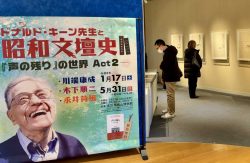
Exhibition Shows Keene’s Interactions with Showa-Era Writers in Tokyo, Features Newspaper Columns, Related Materials
-

The Japan News / Weekly Edition (2/20-2/26)
-

Step Back in Time at Historical Estate Renovated into a Commercial Complex in Tokyo
-

“The Tale of Genji” Back-Translation Project Led to Touching Encounter with Keene; Poet Sisters Recount Memories of Scholar at Packed Talk Event in Tokyo
-
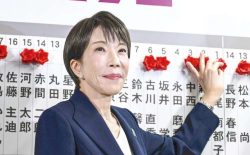
The Japan News / Weekly Edition (2/13-2/19)
JN ACCESS RANKING
-

Producer Behind Pop Group XG Arrested for Cocaine Possession
-

Japan PM Takaichi’s Cabinet Resigns en Masse
-

Man Infected with Measles Reportedly Dined at Restaurant in Tokyo Station
-

Israeli Ambassador to Japan Speaks about Japan’s Role in the Reconstruction of Gaza
-

Videos Plagiarized, Reposted with False Subtitles Claiming ‘Ryukyu Belongs to China’; Anti-China False Information Also Posted in Japan



